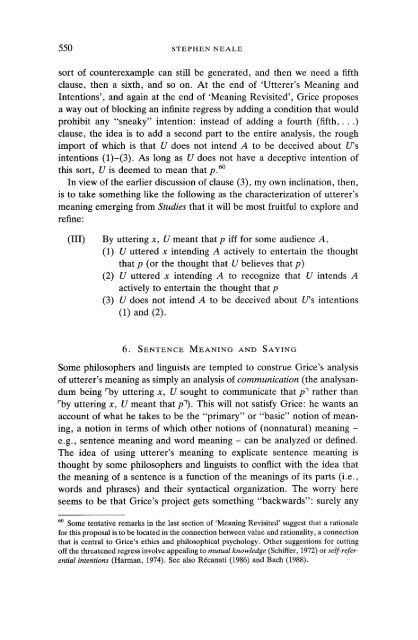Paul Grice and the philosophy of language
Paul Grice and the philosophy of language
Paul Grice and the philosophy of language
You also want an ePaper? Increase the reach of your titles
YUMPU automatically turns print PDFs into web optimized ePapers that Google loves.
550 STEPHEN NEALE<br />
sort <strong>of</strong> counterexample can still be generated, <strong>and</strong> <strong>the</strong>n we need a fifth<br />
clause, <strong>the</strong>n a sixth, <strong>and</strong> so on. At <strong>the</strong> end <strong>of</strong> 'Utterer's Meaning <strong>and</strong><br />
Intentions', <strong>and</strong> again at <strong>the</strong> end <strong>of</strong> 'Meaning Revisited', <strong>Grice</strong> proposes<br />
a way out <strong>of</strong> blocking an infinite regress by adding a condition that would<br />
prohibit any "sneaky" intention: instead <strong>of</strong> adding a fourth (fifth,...)<br />
clause, <strong>the</strong> idea is to add a second part to <strong>the</strong> entire analysis, <strong>the</strong> rough<br />
import <strong>of</strong> which is that U does not intend A to be deceived about U's<br />
intentions (1)-(3). As long as U does not have a deceptive intention <strong>of</strong><br />
this sort, U is deemed to mean that p.60<br />
In view <strong>of</strong> <strong>the</strong> earlier discussion <strong>of</strong> clause (3), my own inclination, <strong>the</strong>n,<br />
is to take something like <strong>the</strong> following as <strong>the</strong> characterization <strong>of</strong> utterer's<br />
meaning emerging from Studies that it will be most fruitful to explore <strong>and</strong><br />
refine:<br />
(III) By uttering x, U meant that p iff for some audience A,<br />
(1) U uttered x intending A actively to entertain <strong>the</strong> thought<br />
that p (or <strong>the</strong> thought that U believes that p)<br />
(2) U uttered x intending A to recognize that U intends A<br />
actively to entertain <strong>the</strong> thought that p<br />
(3) U does not intend A to be deceived about U's intentions<br />
(1) <strong>and</strong> (2).<br />
6. SENTENCE MEANING AND SAYING<br />
Some philosophers <strong>and</strong> linguists are tempted to construe <strong>Grice</strong>'s analysis<br />
<strong>of</strong> utterer's meaning as simply an analysis <strong>of</strong> communication (<strong>the</strong> analys<strong>and</strong>um<br />
being rby uttering x, U sought to communicate that p7 ra<strong>the</strong>r than<br />
~by uttering x, U meant that pT). This will not satisfy <strong>Grice</strong>: he wants an<br />
account <strong>of</strong> what he takes to be <strong>the</strong> "primary" or "basic" notion <strong>of</strong> meaning,<br />
a notion in terms <strong>of</strong> which o<strong>the</strong>r notions <strong>of</strong> (nonnatural) meaning -<br />
e.g., sentence meaning <strong>and</strong> word meaning - can be analyzed or defined.<br />
The idea <strong>of</strong> using utterer's meaning to explicate sentence meaning is<br />
thought by some philosophers <strong>and</strong> linguists to conflict with <strong>the</strong> idea that<br />
<strong>the</strong> meaning <strong>of</strong> a sentence is a function <strong>of</strong> <strong>the</strong> meanings <strong>of</strong> its parts (i.e.,<br />
words <strong>and</strong> phrases) <strong>and</strong> <strong>the</strong>ir syntactical organization. The worry here<br />
seems to be that <strong>Grice</strong>'s project gets something "backwards": surely any<br />
6o Some tentative remarks in <strong>the</strong> last section <strong>of</strong> 'Meaning Revisited' suggest that a rationale<br />
for this proposal is to be located in <strong>the</strong> connection between value <strong>and</strong> rationality, a connection<br />
that is central to <strong>Grice</strong>'s ethics <strong>and</strong> philosophical psychology. O<strong>the</strong>r suggestions for cutting<br />
<strong>of</strong>f <strong>the</strong> threatened regress involve appealing to mutual knowledge (Schiffer, 1972) or self-referential<br />
intentions (Harman, 1974). See also R6canati (1986) <strong>and</strong> Bach (1988).














